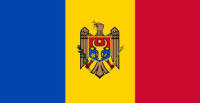''...tour guides Rozle and Klemen worked tirelessly and took care of us like family...''
Destinations

MOLDOVA
- GENERAL INFORMATION
Location: Eastern Europe, northeast of Romania
Border Countries: Romania 683 km, Ukraine 1,202 km
Area: 33,851 sq km
Population: 3,510,485
Capital City: Chisinau (population 725,000)
Religions: Orthodox 93.3%, Baptist 1%, other Christian 1.2%, other 0.9%, atheist 0.4%, none 1%, unspecified 2.2%
Government type:parliamentary republic
Highest point: Dealul Balanesti 430 m
Roadways: 9,352 km, paved: 8,835 km, unpaved: 517 km
Time difference: UTC/GMT +2:00
National currency: Moldovan Leu
International dialing number: +373
Electricity: Ukraine's electrical current is 220 V; 50 cycles and sockets take the standard continental European dual round-pronged plugs.
- VISA
For visitors from most countries (EU, USA, etc) a visa is not needed. Only a valid passport is required
- CLIMATE
moderate winters, warm summers
- TERRAIN
rolling steppe, gradual slope south to Black Sea
- LANGUAGES
Moldovan 58.8% (official; virtually the same as the Romanian language), Romanian 16.4%, Russian 16%, Ukrainian 3.8%, Gagauz 3.1% (a Turkish language), Bulgarian 1.1%, other 0.3%, unspecified 0.4%
- ETHNIC GROUPS
Moldovan 75.8%, Ukrainian 8.4%, Russian 5.9%, Gagauz 4.4%, Romanian 2.2%, Bulgarian 1.9%, other 1%, unspecified 0.4%
- HISTORICAL BACKGROUND
Part of Romania during the interwar period, Moldova was incorporated into the Soviet Union at the close of World War II. Although the country has been independent from the USSR since 1991, Russian forces have remained on Moldovan territory east of the Nistru River supporting the breakaway region of Transnistria, composed of a Slavic majority population (mostly Ukrainians and Russians), but with a sizable ethnic Moldovan minority. Europe's poorest economy, Moldova became the first former Soviet state to elect a communist, Vladimir VORONIN, as its president in 2001. VORONIN served as Moldova's president until he resigned in September 2009. Four Moldovan opposition parties then formed a new coalition, the Alliance for European Integration (AEI), iterations of which acted as Moldova's governing coalitions over the next several years. In May 2013, two of the original AEI parties and a splinter group from a third re-formed a ruling coalition called the Pro-European Coalition. The Moldovan Government in summer 2014 signed and ratified an Association Agreement with the EU, advancing the Coalition's policy priority of EU integration. Following the country's most recent legislative election in November 2014, the three pro-European parties that entered Parliament won a total of 55 of the body's 101 seats. Infighting among coalition members led to prolonged legislative gridlock and political instability, as well as the collapse of two governments, all ruled by pro-European coalitions centered around the Liberal Democratic Party (PLDM) and the Democratic Party (PDM). A political impasse ended in January 2016 when a new parliamentary majority led by PDM, joined by defectors from the Communists and PLDM, supported Pavel FILIP as prime minister.
- ECONOMY OVERVIEW
Despite recent progress, Moldova remains one of the poorest countries in Europe. With a moderate climate and productive farmland, Moldova's economy relies heavily on its agriculture sector, featuring fruits, vegetables, wine, and tobacco. Moldova also depends on annual remittances of about $1.12 billion from the roughly one million Moldovans working in Europe, Russia, and other former Soviet Bloc countries.
With few natural energy resources, Moldova imports almost all of its energy supplies from Russia and Ukraine. Moldova's dependence on Russian energy is underscored by a more than $5 billion debt to Russian natural gas supplier Gazprom, largely the result of unreimbursed natural gas consumption in the breakaway region of Transnistria. Moldova and Romania inaugurated the Ungheni-Iasi natural gas interconnector project in August 2014. The 43-kilometer pipeline between Moldova and Romania, allows for both the import and export of natural gas. Several technical and regulatory delays kept gas from flowing into Moldova until March 2015. Romanian gas exports to Moldova are largely symbolic. Moldova hopes to build a pipeline connecting Ungheni to Chisinau, bringing the gas to Moldovan population centers.
The government's stated goal of EU integration has resulted in some market-oriented progress. Moldova experienced better than expected economic growth in 2014 due to increased agriculture production, to economic policies adopted by the Moldovan government since 2009, and to the receipt of EU trade preferences. Moldova signed an Association Agreement and a Deep and Comprehensive Free Trade Agreement with the EU during fall 2014, connecting Moldovan products to the world’s largest market. Still, a $1 billion asset-stripping heist of Moldovan banks in late 2014 delivered a significant shock to the economy in 2015; a subsequent bank bailout increased inflationary pressures and contributed to the depreciation of the leu. Moldova’s growth has also been hampered by endemic corruption and a Russian import ban on Moldova’s agricultural products.
Over the longer term, Moldova's economy remains vulnerable to corruption, political uncertainty, weak administrative capacity, vested bureaucratic interests, higher fuel prices, Russian political and economic pressure, and unresolved separatism in Moldova's Transnistria region.
- MAIN INDUSTRIES
sugar, vegetable oil, food processing, agricultural machinery; foundry equipment, refrigerators and freezers, washing machines; hosiery, shoes, textiles
- FLAG DESCRIPTION
three equal vertical bands of blue (hoist side), yellow, and red; emblem in center of flag is of a Roman eagle of gold outlined in black with a red beak and talons carrying a yellow cross in its beak and a green olive branch in its right talons and a yellow scepter in its left talons; on its breast is a shield divided horizontally red over blue with a stylized aurochs head, star, rose, and crescent all in black-outlined yellow; based on the color scheme of the flag of Romania - with which Moldova shares a history and culture - but Moldova's blue band is lighter; the reverse of the flag does not display any coat of arms


